Thomas James Richards, Diaries, Transcript Vol. 4, 9 November 1916 - 31 May 1918 - Part 1
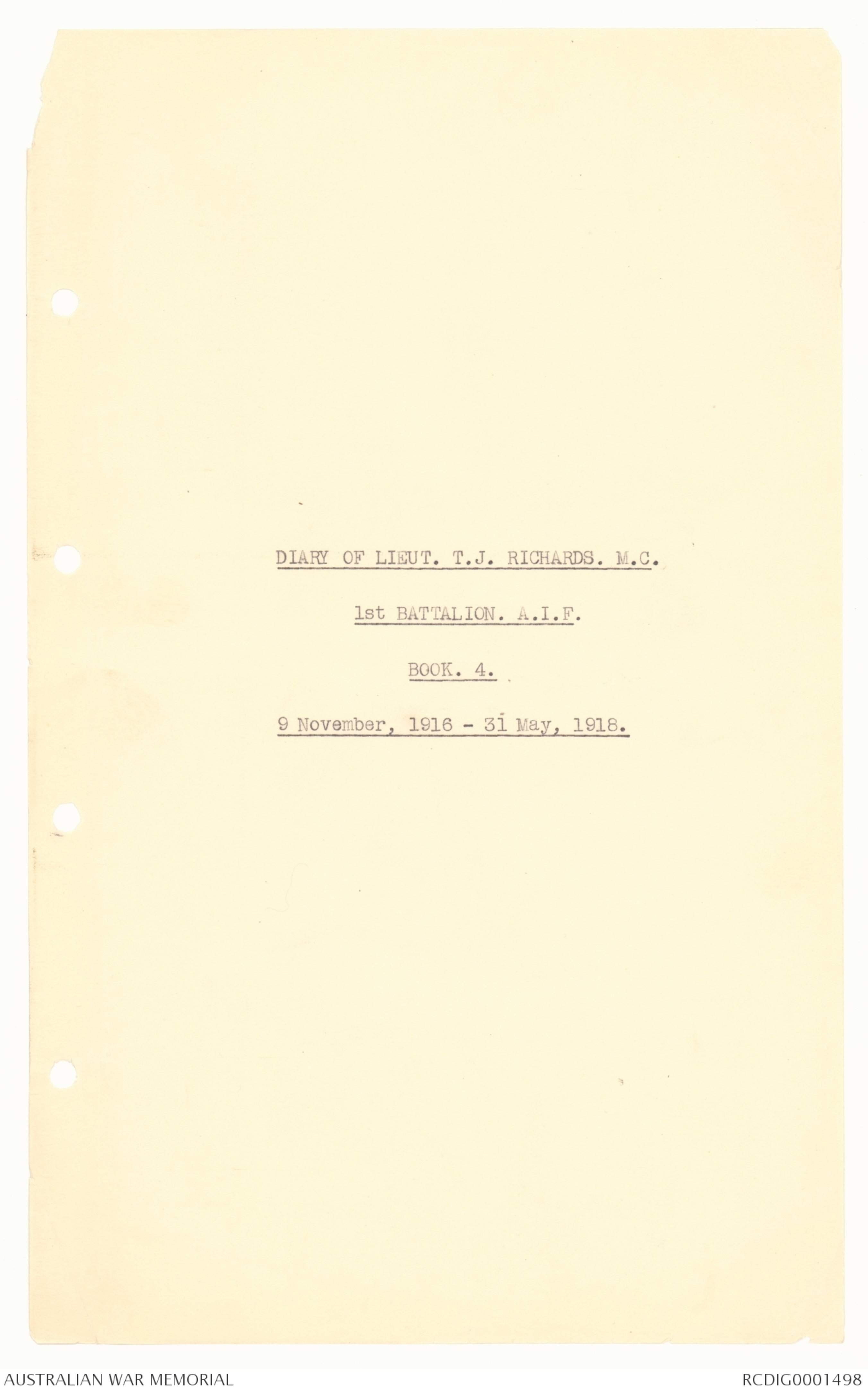
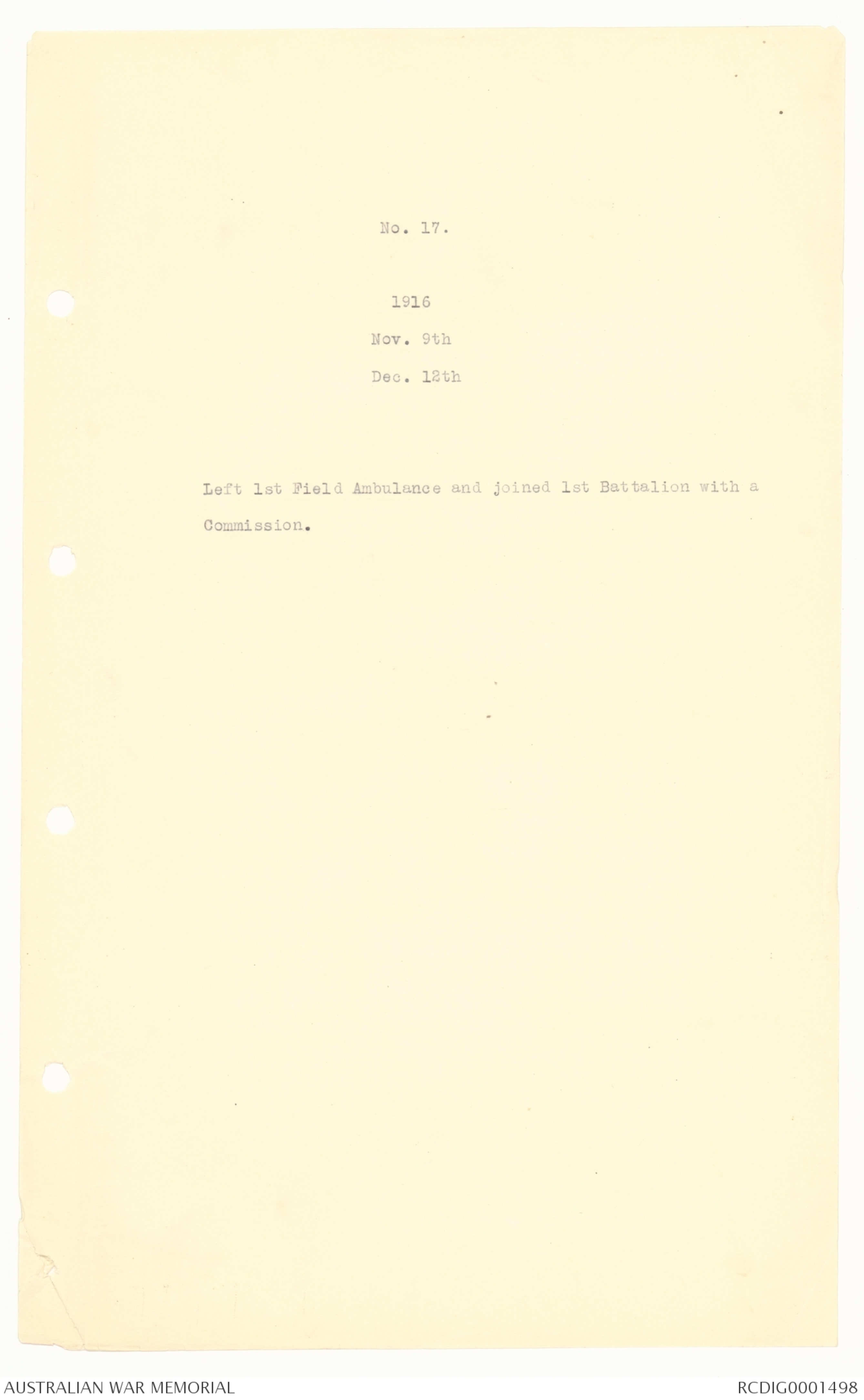
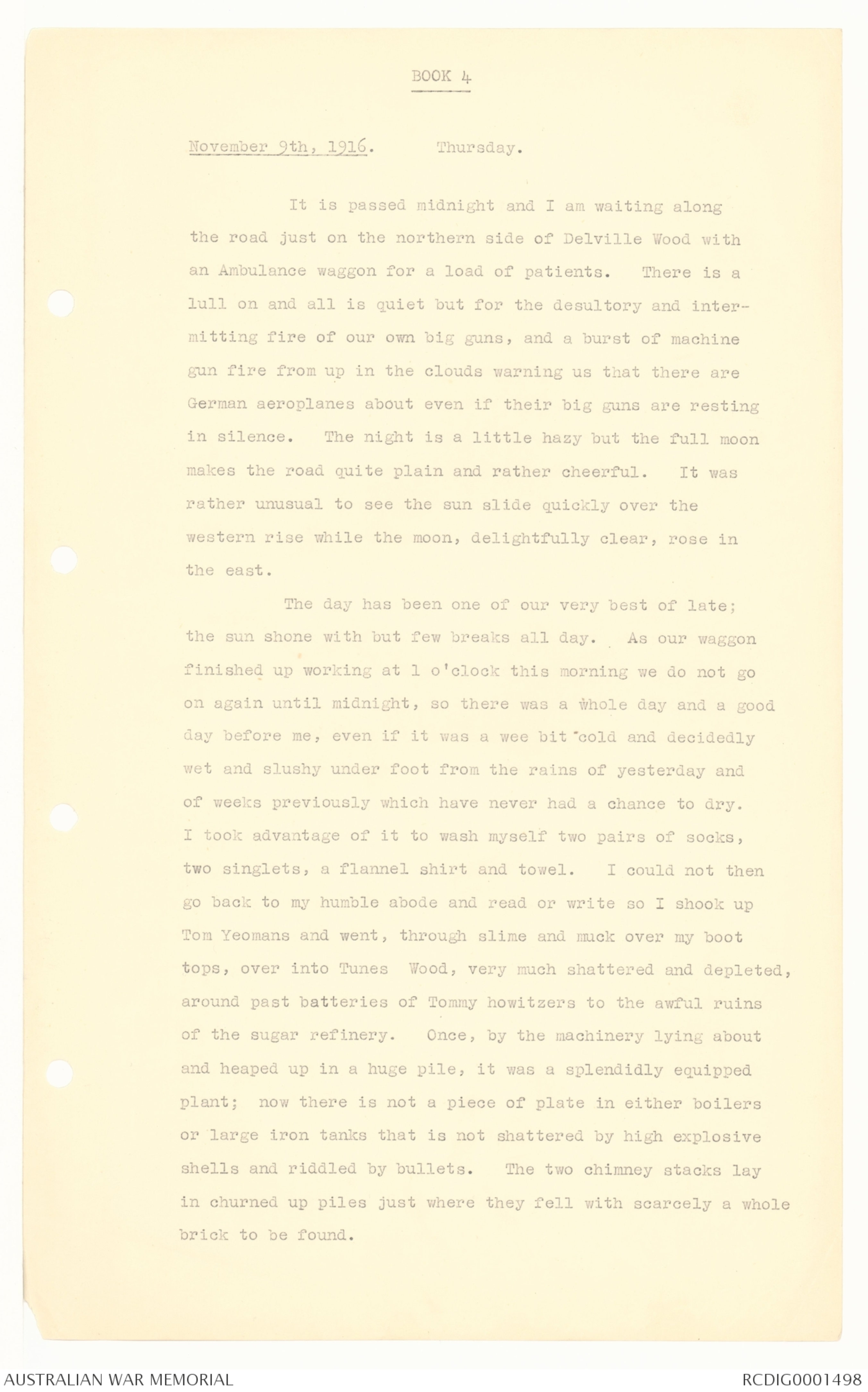
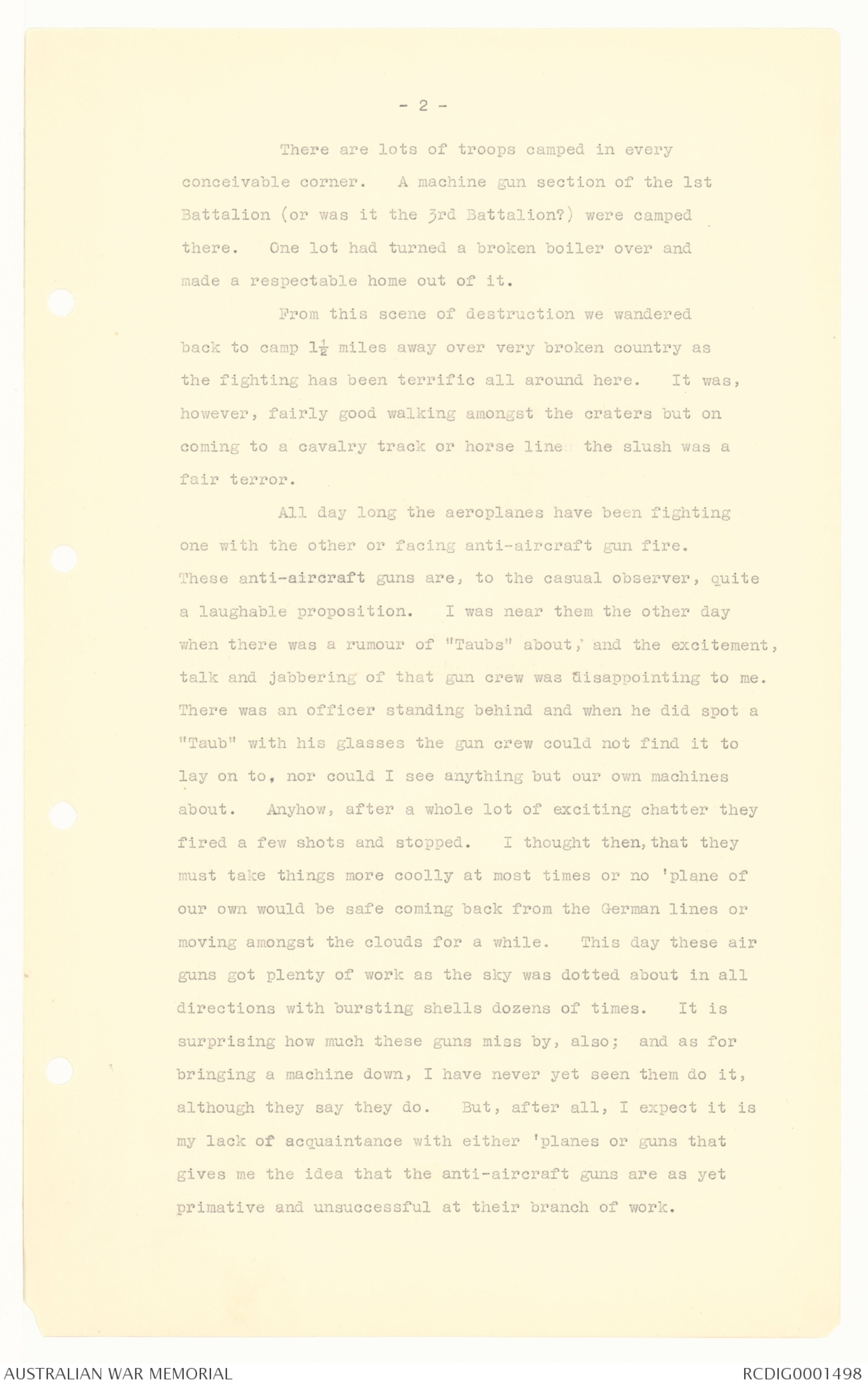
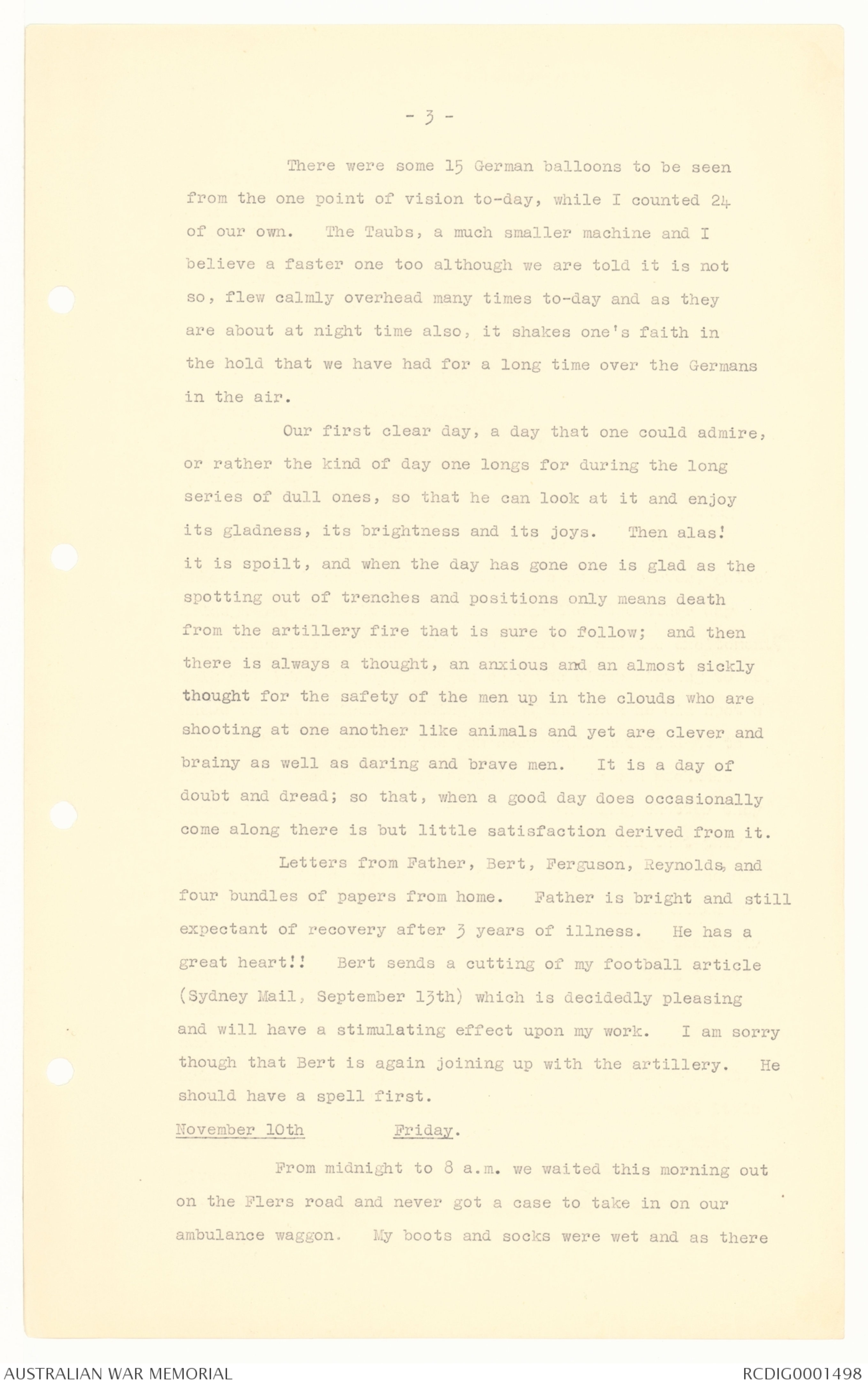
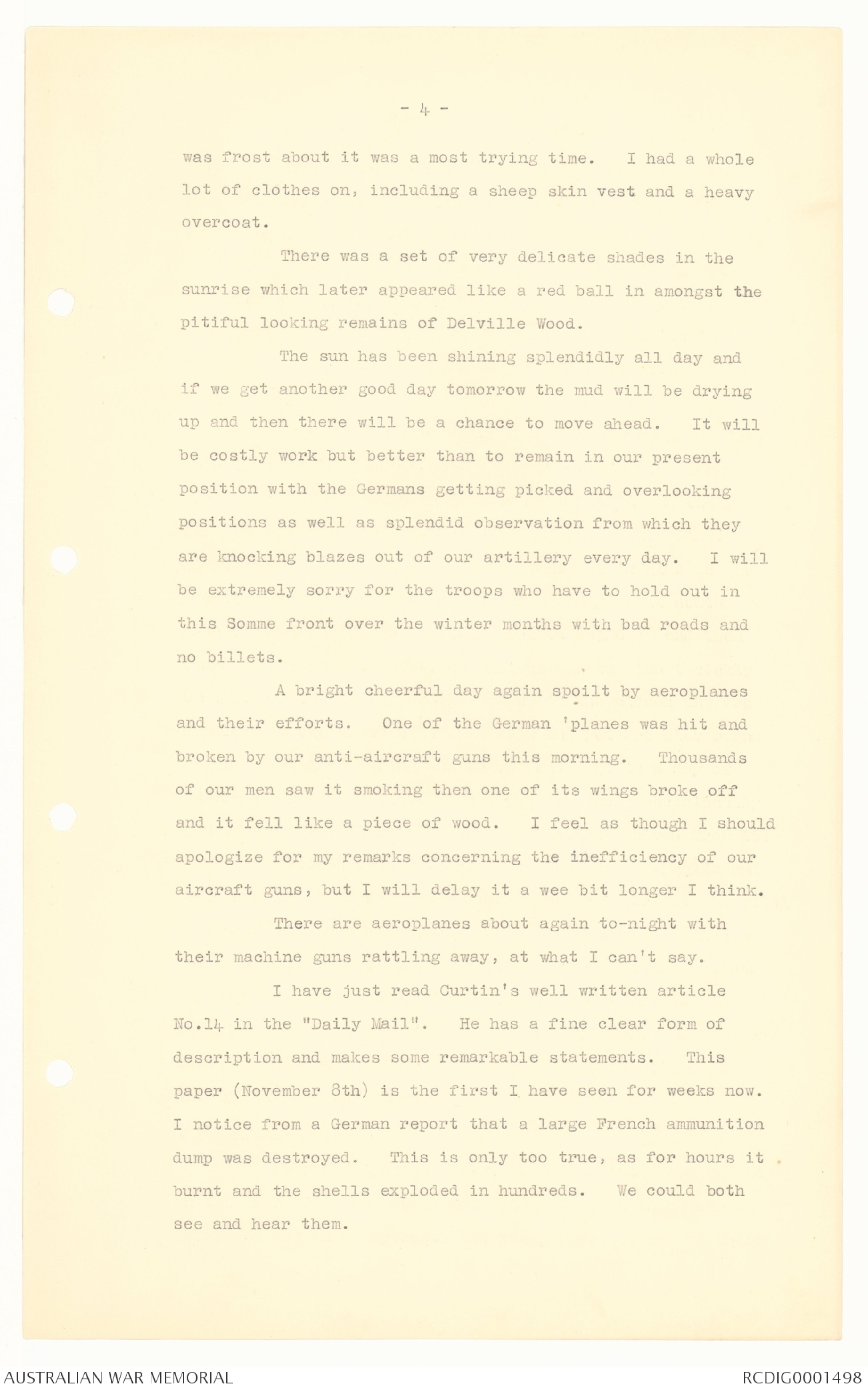
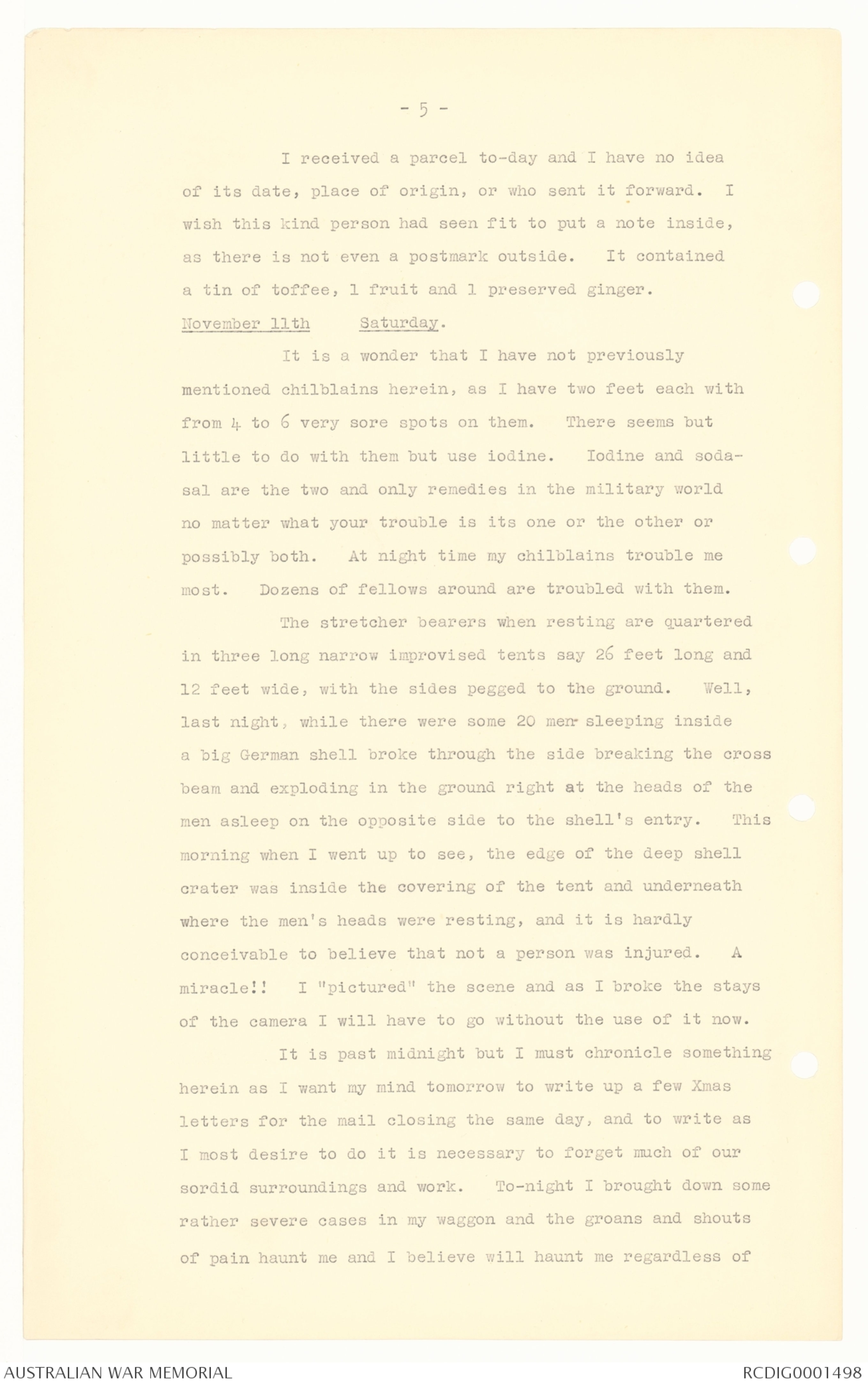
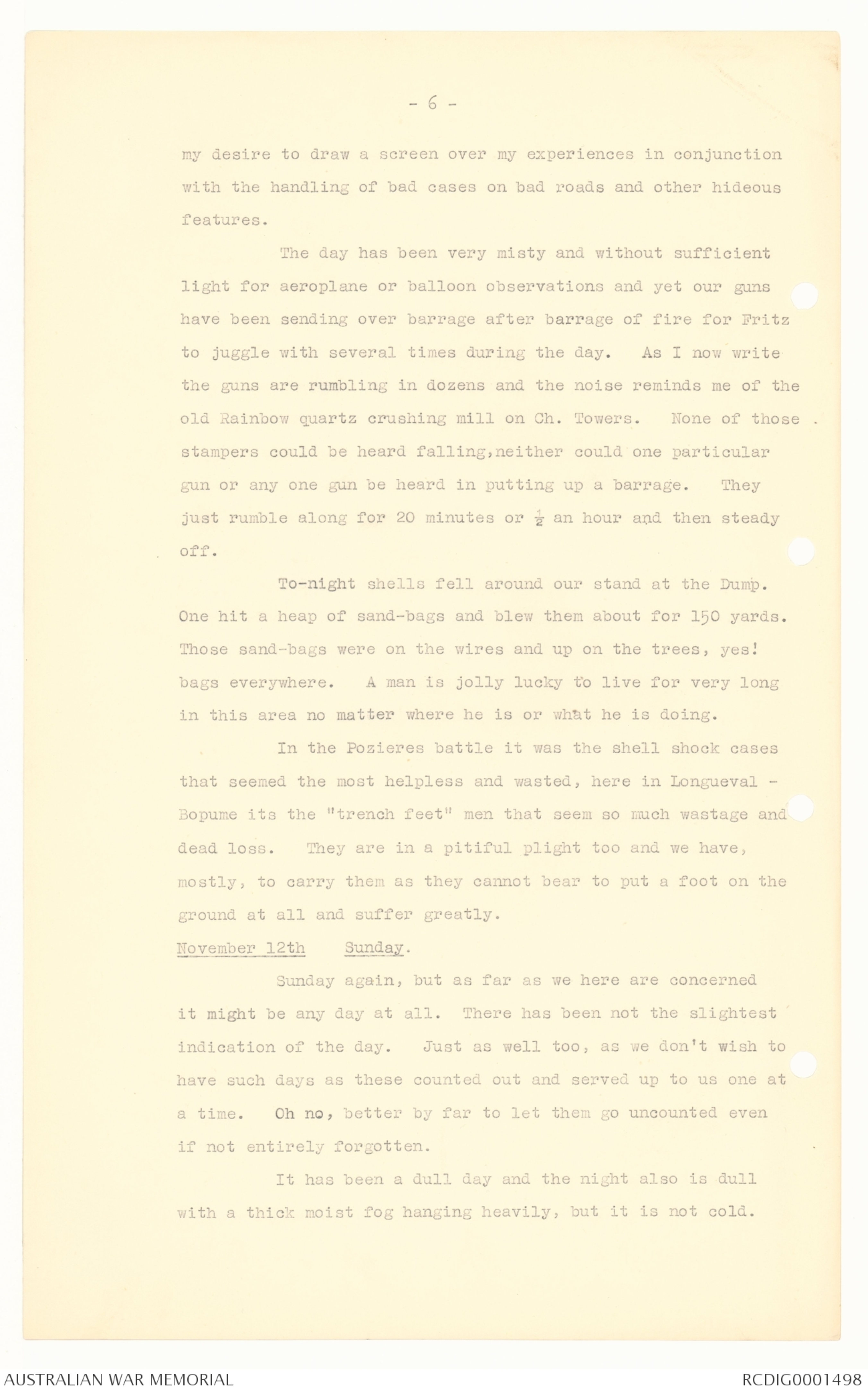
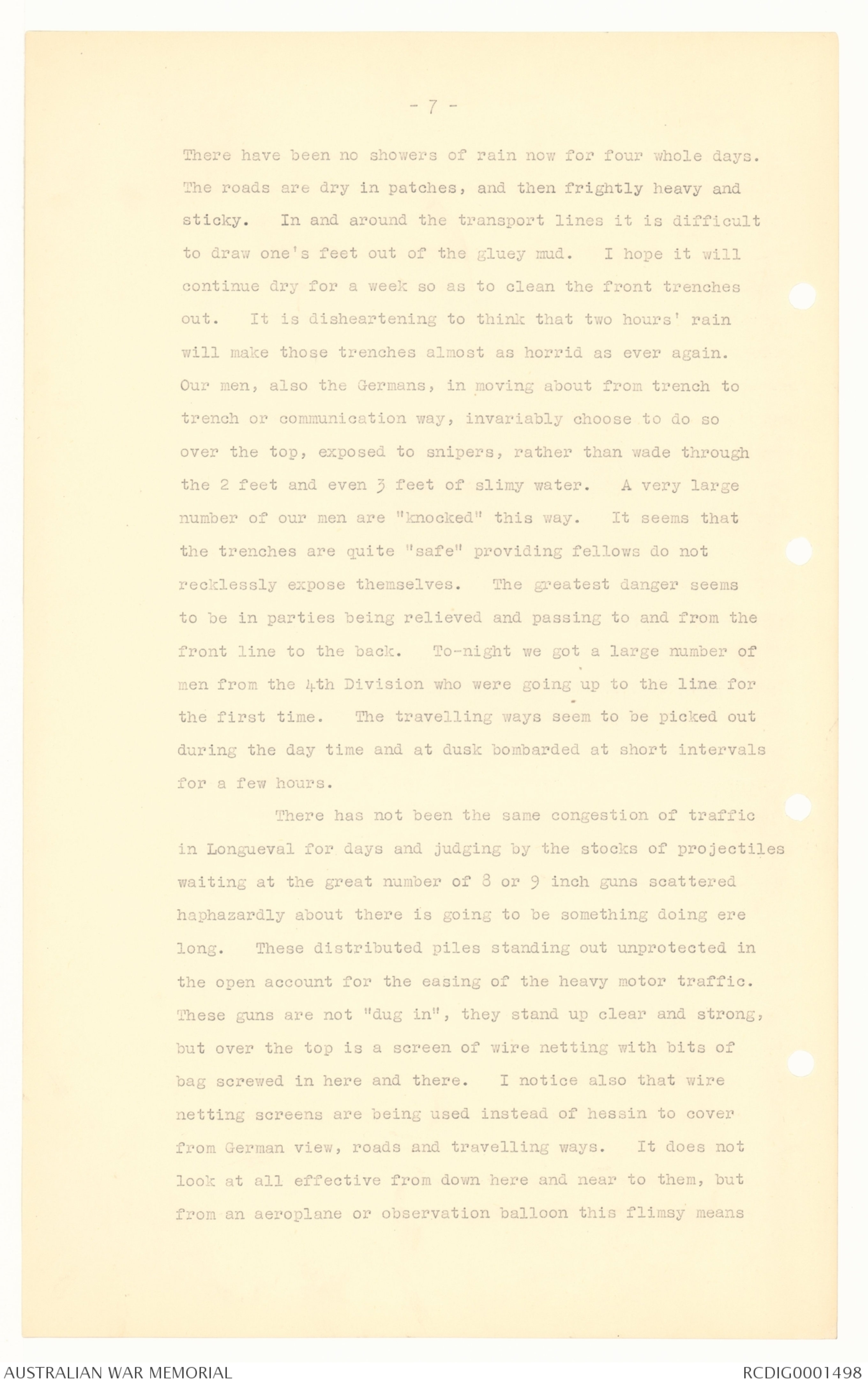
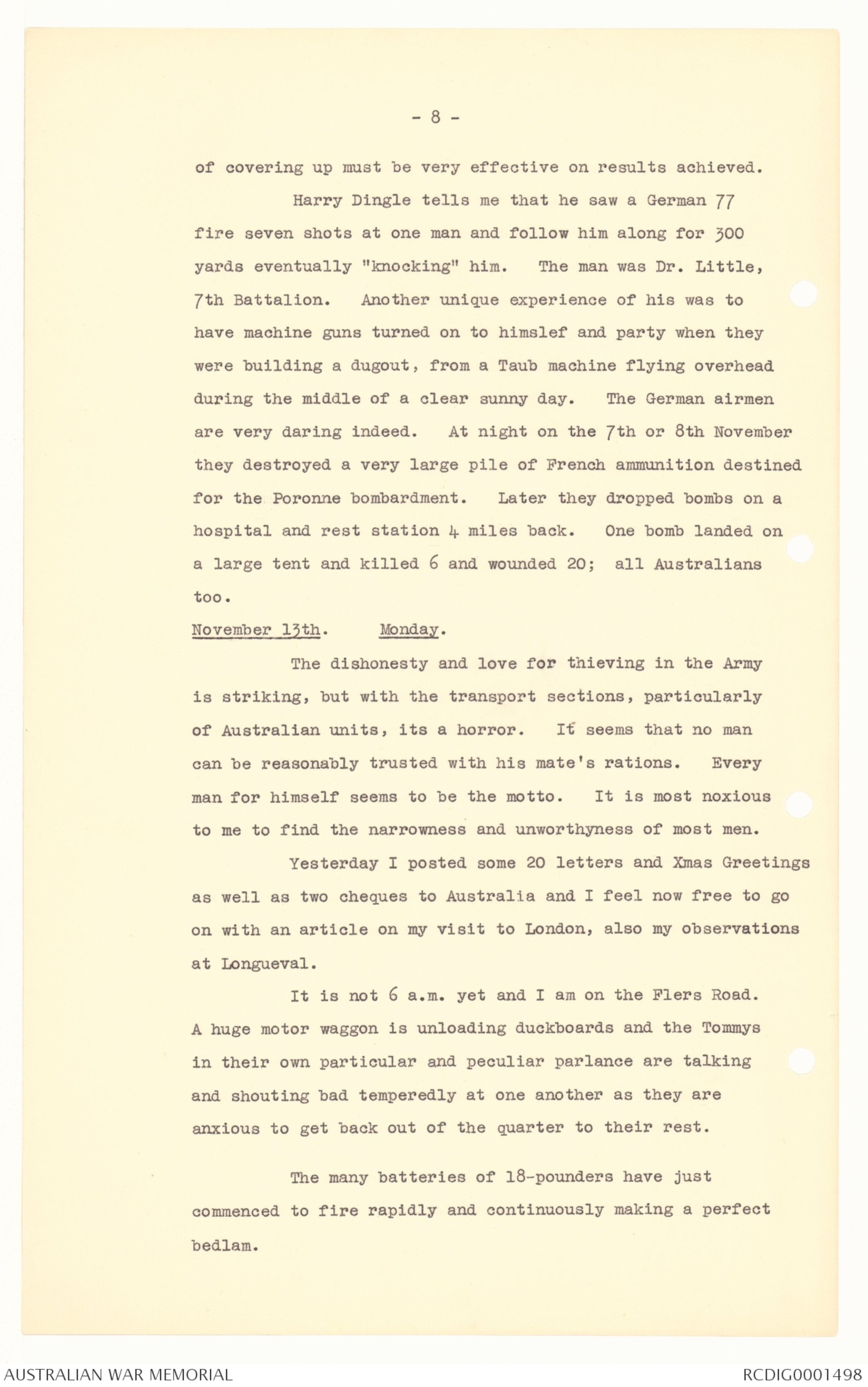
DIARY OF LIEUT. T.J. RICHARDS. M. C.
1st BATTALION. A.I.F
BOOK. 4.
9 NUMBER, 1916 - 31 May, 1918.
No. 17.
1916
Nov. 9th
Dec. 12th
Left 1st Field Ambulance and joined 1st Battalion with a
Commission
BOOK 4
NOVEMBER 9th, 1916 Thursday
It is passed midnight and I am waiting along
the road just on the northern side of Delville Wood with
an Ambulance waggon for a load of patients. There is a
lull on and all is quite but for the desultory and intermitting
fire of our own big guns, and a burst of machine
gun fire from up clouds warning us that there are
German aeroplanes about even if their big guns are resting
in silence. The night is a little hazy but the full moon
makes the road quite plain and rather cheerful. It was
rather unusual to see the sun slide quickly over the
western rise while the moon, delightfully clear, rose in
the east.
The day has been one of our very best of late;
the sun shone with but few breaks all day. As our waggon
finished up working at 1 o'clock this morning we do not go
on again until midnight, so there was whole day and good
day before me, even if it was a wee bit cold and decidedly
wet and slushy under foot from the rains of yesterday and
of weeks previously which have never had a chance to dry.
I took advantage of it to wash myself two pairs of socks
two singlets, a flannel shirt and towel. I could not then
go back to my humble abode and read or write so I shook up
Tom Yeomans and went, through slime and muck over my boot
tops, over into Tunes Wood, very much shattered and depleted,
around past batteries of Tommy howitzers to the awful ruins
of the sugar refinery. Once, by the machinery lying about
and heaped up in huge pile, it was a splendidly equipped
plant; now there is not a piece of plate in either boilers
or large iron tanks that is not shattered by high explosive
shells and riddled by bullets. The two chimneys stacks lay
in churned up piles just where they fell with scarcely a whole
brick to be found.
-2-
There are lots of troops camped in every
conceivable corner. A machine gun section of the 1st
Battalion (or was it the 3rd Battalion?) were camped
there. One lot had turned a broken boiler over
and made a respectable home out of it.
From this scene of destruction we wandered
back to camp 1½ miles away over very broken country as
fighting has been terrific all around here. It was,
however, fairly good walking amongst the craters but on
coming to a cavalry track or horse line the slush was a
fair terror.
All day long the aeroplanes have been fighting
one with the other or facing anti-aircraft gun fire.
These anti-aircraft guns are, to the casual observer, quite
a laughable proposition. I was near them the other day
when there was a rumour of "Taubs" about, and the excitement,
talk and jabbering of that gun crew was disappointing to me.
There was an officer standing behind and when he did spot a
"Taub" with his glasses the gun crew could not find it
to lay on to, nor could I see anything but your own machines
about. Anyhow, after a whole lot of exciting chatter they
fired a few shots and stopped. I thought then that they
must take things more coolly at most times or no 'plane of
our own would be safe coming back from the German lines
moving amongst the clouds for a while. This day these air
guns got plenty of work as the sky was dotted about in all
directions with bursting shells dozens of times. It is
surprising how much these guns miss by, also; and as for
bringing a machine down, I have never yet seen them do it,
although they say they do. But, after all, I except it is
my lack of acquaintance with either 'planes or guns that
gives me the idea that the anti-aircraft guns are as yet
primative and unsuccessful at their branch of work.
- 3 -
There were some 15 German balloons to be seen
from the one point of vision to-day, while I counted 24
of our own. The Taubs, a much smaller machine and I
believe a faster one too although we are told it is not
so, flew calmly overhead many times to-day and as they
are about at night time also, it shakes one's faith in
the hold that we have had for a long time over the Germans
in the air.
Our first clear day, a day that one could admire,
or rather the kind of day one longs for during the long
series of dull ones, so that he can look at it and enjoy
its gladness, its brightness and its joys. Then alas!
it is spoilt, and when the day has gone one is glad as the
spotting out of trenches and positions only means death
from the artillery fire that is sure to follow; and then
there is always a thought, an anxious and an almost sickly
thought for the safety of the men up in the clouds who are
shooting at one another like animals and yet are clever and
brainy as well as daring and brave men. It is a day of
doubt and dread; so that, when a good day does occasionally
come along there is but little satisfaction derived from it.
Letters from Father, Bert, Ferguson, Reynolds, and
four bundles of papers from home. Father is bright and still
expectant of recovery after 3 years of illness. He has a
great heart!! Bert sends a cutting of my football article
(Sydney Mail, September 13th) which is decidedly pleasing
and will have a stimulating effect upon my work. I am sorry
though that Bert is again joining up with the artillery. He
should have a spell first.
November 10th Friday
From midnight to 8 a.m. we waited this morning out
on the Flers road and never got a case to take in on our
ambulance waggon. My boots and socks were wet and as there
-4-
was frost about it was a most trying time. I had a whole
lot of clothes on, including a sheep skin vest and a heavy
overcoat.
There was a set of very delicate shades in the
sunrise which later appeared like a red ball in amongst the
pitiful looking remains of Delville Wood
The sun has been splendidly all day and
if we get another good day tomorrow the mud will be drying
up and then there will be a chance to move ahead. It will
be costly work but better than to remain in our present
position with the Germans getting picked and overlooking
positions as well as splendid observation from which they
are knocking blazes out of our artillery every day. I will
be extremely sorry for the troops who have to hold out in
this Somme front over the winter months with bad roads and
no billets.
A bright cheerful day again spoilt by aeroplanes
and their efforts. One of the German 'planes was hit and
broken by our anti-aircraft guns this morning. Thousands
of our men saw it smoking then one of its wings broke off
and it fell like a piece of wood. I feel as though I should
apologise for my remarks concerning the inefficiency of our
aircraft guns, but I will delay it a wee bit longer I think.
There are aeroplanes about again to-night with
their machine guns rattling away, at what I can’t say.
I have just read Curtin's well written article
\No. 14 in the "Daily Mail" . He has a fine clear form of
description and makes some remarkable statements. This
paper (November 8th) is the first I have seen for weeks now.
I notice from a German report that large French ammunition
dump was destroyed. This is only too true, as for hours it
burnt and shells exploded in hundreds. We could both
see and hear them
-5-
I received a parcel to-day and I have no idea of
its date, place of origin, or who sent it forward. I
wish this kind person had seen fit to put a note inside,
as there is not even a postmark outside. It contained
a tin of toffee, 1 fruit and 1 preserved ginger.
November 11th Saturday.
It is wonder that I have not previously
mentioned chilblains herein, as I have two feet each with
from 4 to 6 very sore spots on them. There seems but
little to do with them but use iodine. Iodine and soda-sal
are the two and only remedies in the military world
no matter what your trouble is its one or the other or
possibly both. At night time my chilblains trouble me
most. Dozen of fellows around are troubled with them.
The stretcher bearers when resting are quartered
in three long narrow improvised tents say 26 feet long and
12 feet wide, with the sides pegged to the ground. Well,
last night, while there were some 20 men sleeping inside
a big German shell broke through the side breaking the cross
beam and exploding in the ground right at the heads of the
men asleep on the opposite side to the shell's entry. This
morning when I went up to see, the edge of the deep shell
crater was inside the covering of the tent and underneath
where the men's heads were resting, and it is hardly
conceived to believe that not a person was injured. A
miracle!! I "pictured" the scene and as I broke the stays
of the camera I will have to go without the use of it now.
It is past midnight but I must chronicle something
herein as I want my mind tomorrow to write up a few Xmas
letters for the mail closing the same day, and to write as
I most desire to do it is necessary to forget much of our
sordid surrounding and work. To-night I brought down some
rather severe cases in my waggon and the groans and shouts
of pain haunt me and I believe will haunt me regardless of
-6-
my desire to draw a screen over my experience in conjunction
with the handling of bad cases on bad roads and other hideous
features.
The day has been very misty and without sufficient
light for aeroplane or balloon observations and yet our guns
have been sending over barrage after barrage of fire for Fritz
to juggle with several times during the day. As I now write
the guns are rumbling in dozens and the noise reminds me of the
old rainbow quartz crushing mill on Ch. Towers. None of those
stampers could be heard falling, neither could one particular
gun or any one gun heard in putting up a barrage. They
just rumble along for 20 minutes or ½ an hour and then steady
off.
To-night shell fell around our stand at the Dump.
One hit a heap of sand-bags and blew them about for 150 yards.
Those sand-bags were on the wires and up the trees, yes!
bags everywhere. A man is jolly lucky to live for very long
in this area no matter where he is or what he is doing.
In the Pozieres battle it was the shell shock cases
that seemed the most helpless and wasted, here in Longueval -
Bopume its the "trench feet" men that seem so much wastage and
dead loss. They are in a pitiful plight to have, and we have,
mostly, to carry them as they cannot bear to put a foot on the
ground at all and suffer greatly.
November 12th Sunday
Sunday again, but as far as we here are concerned
it might be any day at all. There has been not slightest
indication of the day. Just as well too, as we don't wish to
have such days as these counted out and served up to us one at
a time. Oh no, better by far to let them go uncounted even if not entirely forgotten.
It has been a dull day and the night also is dull
with a think moist fog hanging heavily, but it it not cold.
- 7 -
There have been no showers of rain now for four whole days.
The roads are dry in patches, and then frightly heavy and
sticky. In and around the transport lines it is difficult
to draw one's feet out of the gluey mud. I hope it will
continue dry for a week so as to clean the front trenches
out. It is disheartening to think that two hours' rain
will make those trenches almost as horrid as ever again.
Our men, also the Germans, in moving about from trench to
trench or communication way, invariably choose to do so
over the top, exposed to snipers, rather than wade through
the 2 feet and even 3 feet of slimy water. A very large
number of our men are "knocked" this way. It seems that
the trenches are quite "safe" providing fellows do not
recklessly expose themselves. The greatest danger seems
to be in parties being relieved and passing to and from the
front line to the back. To-night we got a large number of
men from the Ath Division who were going up to the line for
the first time. The travelling ways seem to be picked out
during the day time and at dusk bombarded at short intervals
for a few hours.
There has not been the same congestion of traffic
in Longueval for days and judging by the stocks of projectiles
waiting at the great number of 8 or 9 inch guns scattered
haphazardly about there is going to be something doing ere
long. These distributed piles standing out unprotected in
the open account for the easing of the heavy motor traffic.
These guns are not "dug in", they stand up clear and strong,
but over the top is a screen of wire netting with bits of
bag screwed in here and there. I notice also that wire
netting screens are being used instead of hessin to cover
from German view, roads and travelling ways. It does not
look at all effective from down here and near to them, but
from an aeroplane or observation balloon this flimsy means
-8 -
of covering up must be very effective on results achieved.
Harry Dingle tells me that he saw a German 77
fire seven shots at one man and follow him along for 300
yards eventually "knocking" him. The man was Dr. Little,
7th Battalion. Another unique experience of his was to
have machine guns turned on to himself and party when they
were building a dugout, from a Taub machine flying overhead
during the middle of a clear sunny day. The German airmen
are very daring indeed. At night on the 7th or 8th November
they destroyed a very large pile of French ammunition destined
for the Poronne bombardment. Later they dropped bombs on a
hospital and rest station 4 miles back. One bomb landed on
a large tent and killed 6 and wounded 20 ; all Australians
too.
November 13th. Monday.
The dishonesty and love for thieving in the Army
is striking, but with the transport sections, particularly
of Australian units, its a horror. It seems that no man
can be reasonably trusted with his mate's rations. Every
man for himself seems to be the motto. It is most noxious
to me to find the narrowness and unworthyness of most men.
Yesterday I posted some 20 letters and Xmas Greetings
as well as two cheques to Australia and I feel now free to go
on with an article on my visit to London, also my observations
at Longueval.
It is not 6 a.m. yet and I am on the Flers Road.
A huge motor waggon is unloading duckboards and the Tommys
in their own particular and peculiar parlance are talking
and shouting bad temperedly at one another as they are
anxious to get back out of the quarter to their rest.
The many batteries of 18-pounders have just
commenced to fire rapidly and continuously making a perfect
bedlam.
 Sam scott
Sam scottThis transcription item is now locked to you for editing. To release the lock either Save your changes or Cancel.
This lock will be automatically released after 60 minutes of inactivity.